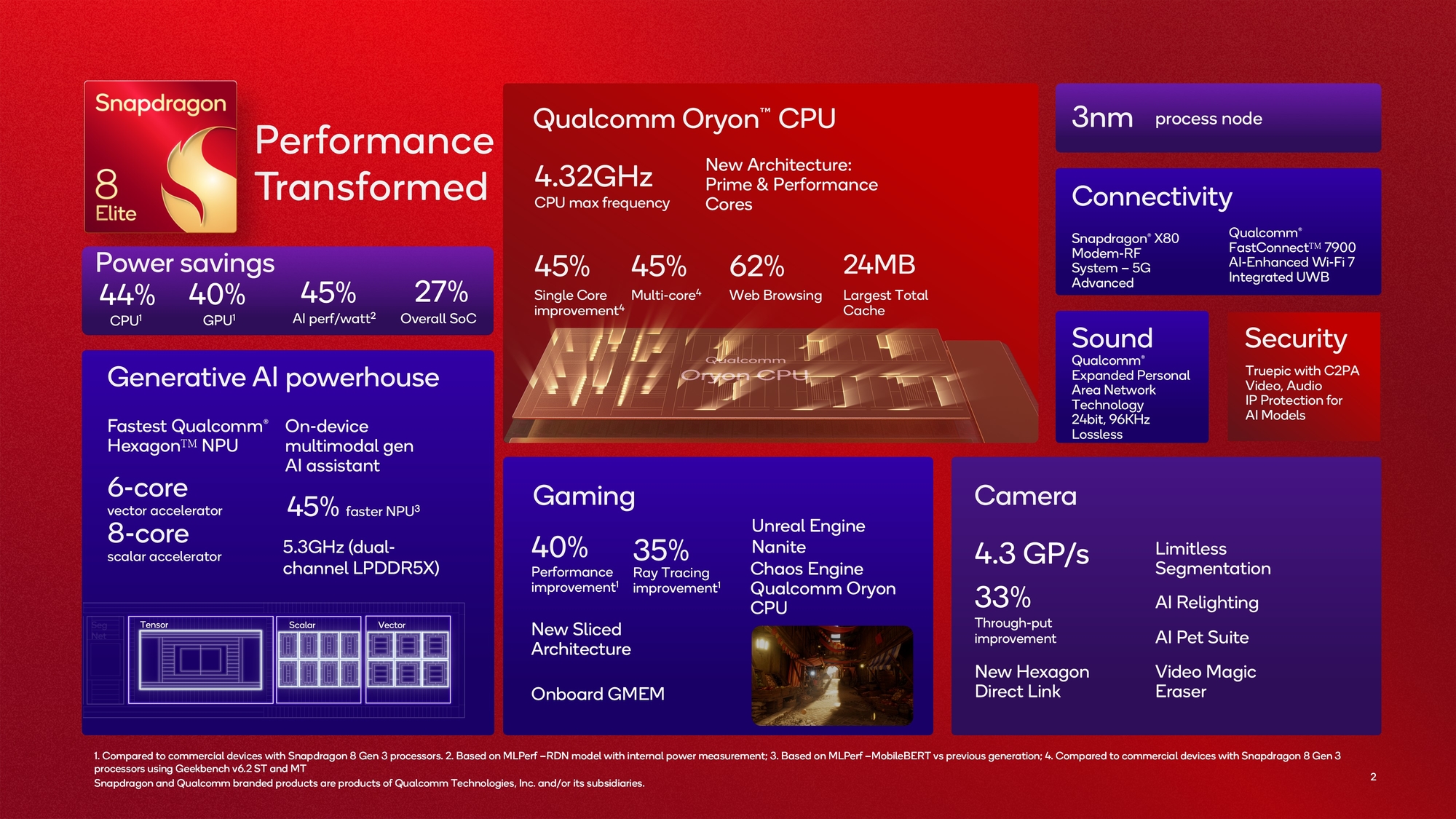
At Snapdragon Summit 2024, Qualcomm unveiled its new Snapdragon 8 Elite mobile chipset with the usual marketing cocktail of flashy benchmark scores and bold performance promises (“the GPU is 40% faster” etc.), but it can be hard to discern how – or indeed if – these on-paper improvements will enhance the real-world experience of Android users.
Qualcomm, of course, is acutely aware that good-looking numbers don’t tell the whole story, and the semiconductor giant was happy to elaborate on the tangible benefits of its Snapdragon 8 Elite chipset when posed a question on the matter in a roundtable interview attended by TechRadar.
Chris Patrick, SVP of Qualcomm’s Mobile Handset division, began his refreshingly jargon-free answer by referencing the Snapdragon 8 Elite’s gaming-related upgrades: “Gaming is one use case that really pushes a smartphone chipset to its limit [because] it keeps consuming every possible processing resource,” the former engineer explained.
“The difference between playing a game when it's struggling to render the frame, or struggling to process multiple characters on the screen [...] and the experience we’ve had testing Oryon [the CPU inside the Snapdragon 8 Elite] [is stark]. Those experiences are now effortless. There's no lag. The device isn't heating up anymore, even at ridiculous levels of detail. So, that's a pretty compelling [upgrade].”

“We’ve also talked about web browsing,” Patrick continued. “In a way, web browsing seems old-fashioned but in the end, that's what people do with phones, right? Download, consume, and interact with web pages – there are mobile versions and then desktop versions.
“Now, with this elite class of processor, you don’t need the mobile version [of web pages] anymore. Even a more complex, more heavy, more feature-rich desktop version [of a page] will feel effortless. The device [equipped with Snapdragon 8 Elite] will not struggle to load it. Those same web engines are at the heart of many, many applications. Many applications that you run, they’re used to accepting some limitations – now, they’ll be snappy and responsive. This will make a big impact.”
Even a more complex, more heavy, more feature-rich desktop version [of a page] will feel effortless.
Chris Patrick
Also in attendance at the roundtable interview, Shahin Farahani, Senior Director of Product Management at Qualcomm, weighed in with his thoughts on the Snapdragon 8 Elite’s real-world upgrades: “There are a few more [upgrades] that are easy to explain. [With the Snapdragon 8 Elite] I now have a higher [generative AI] resolution available to me – 512 x 512 image resolution before, now I can do 1024 x 1024. That’s four times bigger.
Sign up for breaking news, reviews, opinion, top tech deals, and more.
“You [also] get significantly better power saving,” Farahani continued. “If you look at the GPU power rate when playing a game, it’s 40% more efficient, so you’re getting much longer battery life. Benchmarks are part of any [chipset] evaluation, but they’re not everything.”

So there you have it, folks. Slicker gaming, smoother web browsing, and better battery life brought about by improvements in CPU and GPU efficiency – that’s Qualcomm Snapdragon 8 Elite upgrade promise in a nutshell.
As for which upcoming devices will ship with the new chipset, we know that the Xiaomi 15 and Honor Magic 7 will definitely feature the Snapdragon 8 Elite, while as-yet-unannounced devices including the Samsung Galaxy S25 and OnePlus 13 will also surely follow suit. Here’s hoping next year’s best Android phones can rival Apple’s best iPhones for power.
You might also like
- Did Qualcomm just kill the ring light? Future Android phones could let you add a virtual, moveable light source to video calls
- Best iPhone: which Apple smartphone reigns supreme?
- Best Android phones: from high-performance to highly affordable

Axel is TechRadar's Phones Editor, reporting on everything from the latest Apple developments to newest AI breakthroughs as part of the site's Mobile Computing vertical. Having previously written for publications including Esquire and FourFourTwo, Axel is well-versed in the applications of technology beyond the desktop, and his coverage extends from general reporting and analysis to in-depth interviews and opinion.
Axel studied for a degree in English Literature at the University of Warwick before joining TechRadar in 2020, where he earned an NCTJ qualification as part of the company’s inaugural digital training scheme.